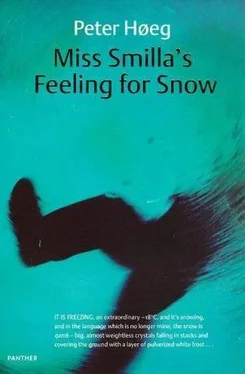Peter Høeg - Smilla's Sense of Snow aka Miss Smilla's Feeling for Snow
Здесь есть возможность читать онлайн «Peter Høeg - Smilla's Sense of Snow aka Miss Smilla's Feeling for Snow» весь текст электронной книги совершенно бесплатно (целиком полную версию без сокращений). В некоторых случаях можно слушать аудио, скачать через торрент в формате fb2 и присутствует краткое содержание. Жанр: Современная проза, на английском языке. Описание произведения, (предисловие) а так же отзывы посетителей доступны на портале библиотеки ЛибКат.
- Название:Smilla's Sense of Snow aka Miss Smilla's Feeling for Snow
- Автор:
- Жанр:
- Год:неизвестен
- ISBN:нет данных
- Рейтинг книги:3 / 5. Голосов: 1
-
Избранное:Добавить в избранное
- Отзывы:
-
Ваша оценка:
- 60
- 1
- 2
- 3
- 4
- 5
Smilla's Sense of Snow aka Miss Smilla's Feeling for Snow: краткое содержание, описание и аннотация
Предлагаем к чтению аннотацию, описание, краткое содержание или предисловие (зависит от того, что написал сам автор книги «Smilla's Sense of Snow aka Miss Smilla's Feeling for Snow»). Если вы не нашли необходимую информацию о книге — напишите в комментариях, мы постараемся отыскать её.
Smilla's Sense of Snow aka Miss Smilla's Feeling for Snow — читать онлайн бесплатно полную книгу (весь текст) целиком
Ниже представлен текст книги, разбитый по страницам. Система сохранения места последней прочитанной страницы, позволяет с удобством читать онлайн бесплатно книгу «Smilla's Sense of Snow aka Miss Smilla's Feeling for Snow», без необходимости каждый раз заново искать на чём Вы остановились. Поставьте закладку, и сможете в любой момент перейти на страницу, на которой закончили чтение.
Интервал:
Закладка:
I move cautiously, to keep warm and to test his attentiveness.
"Loyen came here in the thirties. With a German expedition. They were going to do preliminary construction for an airport on a narrow strip of flat coastland on the north side. They brought Thule Inuits with them. They couldn't get any West Greenlanders to come along because of the island's bad reputation. Loyen began his search the same way Knud Rasmussen did when he discovered his meteorites. By taking the Inuit stories seriously. And he found the meteorite. In '66 he came back. He and Ving and Andreas Fine Licht. But they didn't know enough to solve the technical problems. They constructed a permanent passageway to the stone. Then the expedition was cut short. In 1991 they came back. That's when we came along, too. But we were forced to return home."
His face is almost invisible in the dark; the only solid thing is his voice. I'm trying to figure out why he's telling me all this. Why he's still lying, even under these circumstances, when he's totally in control.
"What about the pieces that were cut off?"
His hesitation explains everything, and it's a relief to figure out what he's up to. He still isn't sure how much I know or whether I'm alone. Whether someone might be waiting for him-on the island, at sea, or when he gets back home. For a short time, until I have talked, he still has some use for me.
At the same time, another more important realization comes to me. The fact that he's waiting, that he has to wait, means that the mechanic hasn't told him everything; he hasn't told him that I'm alone.
"We examined the pieces. We didn't find anything unusual. They consisted of a mixture of iron, nickel, peridotite, magnesium, and silicates."
I'm sure that he's telling the truth. "So it's not alive?"
In the darkness I sense his smile.
"There's heat. It's definitely producing heat. Otherwise it would have been carried out along with the ice. It melts the walls surrounding it at a rate comparable to the movement of the glacier."
"Radioactivity?"
"We tested for it, but didn't find any."
"And the dead men?" I ask. "What about the X-rays? The light-colored stripes inside their internal organs?" He pauses for a moment.
"You wouldn't want to tell me how you know about that, would you?" he asks.
I don't answer.
"I knew it," he says. "You and I, we could have made a good team. When I called you that night, it was on an impulse; I trust my intuition. I knew you would pick up the phone. I had you all figured out. I could have said, `Come over to our side.' Would you have come?"
"No."
The tunnel starts at the foot of the rock. It's a simple design. They dynamited their way down where the ice had a natural tendency to let go of the rock, and then they cemented large concrete sewer pipes to the wall of the tunnel. The pipes slant down at a steep angle; the steps inside are made of wood. This surprises me at first, until I remember how difficult it can be to pour cement on a permafrost foundation.
Thirty feet down there's a fire.
The smoke is coming from a room adjacent to the stairs, a cement shell reinforced with beams. Several sacks are spread on the floor. On top of the sacks there's an oil barrel filled with burning, chopped-up wooden crates.
Against the opposite wail, instruments and equipment are piled on a wide table. Chromatographs, microscopes, large crystallization jars, an incubator, and an apparatus I've never seen before, built like a big plastic box with glass on the front. Underneath the table there's a generator and more wooden crates like the ones burning in the barrel. Nowadays everything goes in and out of style, even laboratory equipment, and these instruments remind me of the seventies. Everything is covered with a layer of gray ice. They must have been left behind in '66 or '91.
Tørk places his hand on the plastic box. "Electrophoresis. To separate and analyze proteins. Loyen brought it along in '66. When they still thought they were dealing with some form of organic life."
He gives a small nod. Everything he does is pervaded with the knowledge that these small signs and gestures are enough to make the rest of the world fall into place. Verlaine is standing at a tall worktable with a dissecting microscope. He adjusts it for me, the ocular on 10 and the objective on 20. He moves a gas lamp closer.
"We're in the process of thawing out the generator." At first I don't see a thing. Then I adjust the focus and see a coconut. "Cyclops marinus," says Tørk. "Water flea. It or its relatives are found everywhere, in all the oceans of the globe. The threads are organs of equilibrium. We've given it a little hydrochloric acid; that's why it's so still. Try looking at the back of the body. What do you see?"
I don't see anything. He takes over the microscope, moving the petri dish under it and adjusting the focus again.
"The digestive system," I say. "The intestines."
"Those aren't intestines. That's a worm."
Now I see it. The intestines and stomach form a dark field along the underside of the animal. The long bright channel goes up along its back.
"The primary group is Phylum nematoda, roundworm, and it belongs to the subclass Dracunculoidea. Its name is Dracunculus borealis, the Arctic worm. Known and described since at least the Middle Ages. A large parasite. Found in whales, seals, and dolphins; it penetrates the musculature from the intestines. The males and females mate, the male dies, and the female wanders to the subcutis, where it forms a nodule as big as a child's fist. When the mature worm senses that there are Cyclops in the surrounding water, it perforates the skin and releases millions of small living larvae into the sea, where they're eaten by the water fleas, forming what is called a host, a place where the worms can go through a process of development lasting several weeks. When the flea, via seawater, gets into the mouth cavity or intestines of a larger mammal, it disintegrates and the larva gets out and bores into this new and larger host. There it matures, mates, makes it way to the subcutis, and completes the cycle. Apparently neither the water flea nor the mammal suffers any harm from it. One of the world's most well adapted parasites. Have you ever wondered what prevents parasites from spreading?"
Verlaine puts on more wood and pulls the generator over to the fire. The radiant heat burns one side of my body; the other is cold. There's no proper ventilation. The smoke is suffocating. They must be in a hurry.
"Some kind of obstruction is what always stops the parasites. Take, for instance, the Guinea worm, which is the closest relative of the Arctic worm. It's dependent on heat and stagnant water. It's found wherever people are dependent on surface water."
"Such as on the border between Burma, Laos, and Cambodia," I say. "For instance, in Chiang Rai."
They both freeze. In Tørk it's a barely visible pause. "Yes," he says, "in Chiang Rai, for example, during the relatively rare periods of drought. As soon as it rains and the water begins to flow, as soon as it cools off, the conditions become more difficult for the worm. That's the way things have to be. Parasites have developed along with their hosts. The Guinea worm has developed along with human beings, perhaps over the past million years. They are mutually compatible. Every year 140 million people are exposed to the risk of being infected with the Guinea worm. There are 10 million cases annually. Most of those who are infected endure a painful period of several months, but then the worm is expelled. Even in Chiang Rai only half a percent of the adult population, at the most, suffer any permanent damage. This is one of the primary rules of nature's delicate balance: A good parasite does not kill its host."
He moves slightly, and I involuntarily step back. He looks in the microscope.
Читать дальшеИнтервал:
Закладка:
Похожие книги на «Smilla's Sense of Snow aka Miss Smilla's Feeling for Snow»
Представляем Вашему вниманию похожие книги на «Smilla's Sense of Snow aka Miss Smilla's Feeling for Snow» списком для выбора. Мы отобрали схожую по названию и смыслу литературу в надежде предоставить читателям больше вариантов отыскать новые, интересные, ещё непрочитанные произведения.
Обсуждение, отзывы о книге «Smilla's Sense of Snow aka Miss Smilla's Feeling for Snow» и просто собственные мнения читателей. Оставьте ваши комментарии, напишите, что Вы думаете о произведении, его смысле или главных героях. Укажите что конкретно понравилось, а что нет, и почему Вы так считаете.




![Рута Шепетис - Ashes in the Snow [aka Between Shades of Gray]](/books/414915/ruta-shepetis-ashes-in-the-snow-aka-between-shades-thumb.webp)







